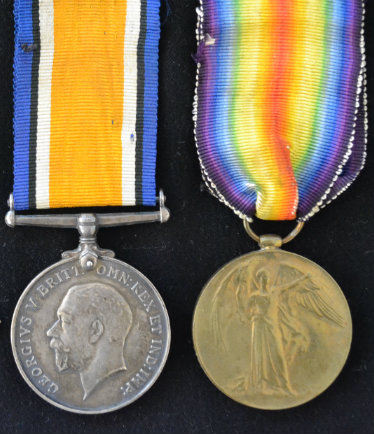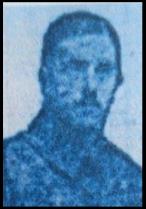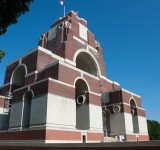Personal Details
William Ernest Burrows was born in Whitchurch in 1892. He was the fourth son of George and Emma Burrows of 39, Talbot Street, Whitchurch.
William enlisted in September 1914, he was a member of the Church Lads Brigade.
William's elder brother George was also killed in action, two weeks later.
Military Details
Regiment : 16th (Service) Battalion King’s Royal Rifle Corps (Church Lads Brigade)
Rank : Rifleman
Service Number : C/460
Killed in Action; France 15th July 1916 Age 23

The British War Medal (also known as 'Squeak') was a silver or bronze medal awarded to officers and men of the British and Imperial Forces who either entered a theatre of war or entered service overseas between 5th August 1914 and 11th November 1918 inclusive. This was later extended to services in Russia, Siberia and some other areas in 1919 and 1920. Approximately 6.5 million British War Medals were issued. Approximately 6.4 million of these were the silver versions of this medal. Around 110,000 of a bronze version were issued mainly to Chinese, Maltese and Indian Labour Corps. The front (obv or obverse) of the medal depicts the head of George V. The recipient's service number, rank, name and unit was impressed on the rim.
The Allied Victory Medal (also known as 'Wilfred') was issued by each of the allies. It was decided that each of the allies should each issue their own bronze victory medal with a similar design, similar equivalent wording and identical ribbon. The British medal was designed by W. McMillan. The front depicts a winged classical figure representing victory. Approximately 5.7 million victory medals were issued. Interestingly, eligibility for this medal was more restrictive and not everyone who received the British War Medal ('Squeak') also received the Victory Medal ('Wilfred'). However, in general, all recipients of 'Wilfred' also received 'Squeak' and all recipients of The 1914 Star or The 1914/1915 Star (also known as 'Pip') also received both 'Squeak' and 'Wilfred'. The recipient's service number, rank, name and unit was impressed on the rim.
Further Information
Letter to the parents of William Ernest Burrows in the Wellington Journal & Shrewsbury News July 1916 regarding the death of their son.
“I much regret having to tell you that your son Rifleman W E Burrows was killed in action while the company was attacking a wood, during the advance on the 15th July. He will much missed by the company, as he was popular with his comrades, and had done good work as a sniper during our tours of duty in the trenches. His company officer was pleased with his work, and would have written to you personally, but unfortunately he was also killed in the same action. Hoping you will find comfort in your bereavement. I am yours, with deepest sympathy.”
Company Sergeant Major, Beekley
Wellington Journal & Shrewsbury News July 1916
If you can provide any further information on William Ernest Burrows please get in touch by leaving a comment below, using our Contact Form or by calling in to Whitchurch Heritage Centre.
Information provided by Terry Evanson Whitchurch, Shropshire and Whitchurch Museum and Archives


